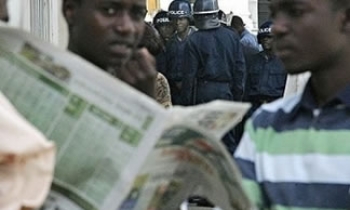Sudanese journalists have launched a mass hunger strike and three independent newspapers stopped work for three days in the country's biggest organised media protest against censorship. Over 150 journalists began a 24-hour hungerstrike and the Ajras al-Hurriya, Al-Maidan and Rayal al-Shab newspapers halted production, saying they could no longer accept government restrictions over editorial content.
"We are growing sick of these practices," Salah Kajam, publisher of independent Ajras al-Hurriya (Freedom Bells in Arabic) told the Associated Press (AP). He said state security agents regularly visit his paper's offices late at night to remove articles critical of the government, reports of violence in Darfur and mysterious outbreaks of fever in south Sudan among other things. [Link]
Rayal al-Shab, a paper connected with the Islamist opposition, said it will also stop printing until Friday. "The papers that are coming out every day don't represent us or the people any more. They are monsters," said Nagi Dahab, the paper's manager, according to AP. Lawyers for the newspapers said they are contesting the censorship in the Constitutional Court. Nabil Adeeb, the attorney in charge of the case, said reporting on the suit has also been censored. No date has been set for a court ruling.
Freedom of the press was guaranteed in Sudan, which produces 500,00 barrels of oil a day, in a 2005 peace deal that ended more than two decades of north-south civil war, but newspaper journalists repeatedly complain about nightly visits from security officers who check copy and order editors to remove sensitive articles, a Reuters report recollected [Link].
Reporters and human rights activists say the current crackdown started in February after newspapers published reports accusing the government of backing Chadian rebels in a failed coup attempt. The government denies the charge.
Ajras al-Hurriya columnist Yai Joseph said he had been censored on a range of subjects including the Darfur conflict, corruption allegations, food price hikes and pollution, according to the Reuters report. "I have been interrogated many times by security officers," said Amal Abbas, a columnist for Al-Sahafa newspaper who is taking part in the hunger strike and suspending her column.









